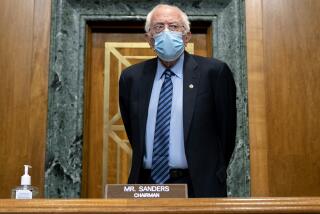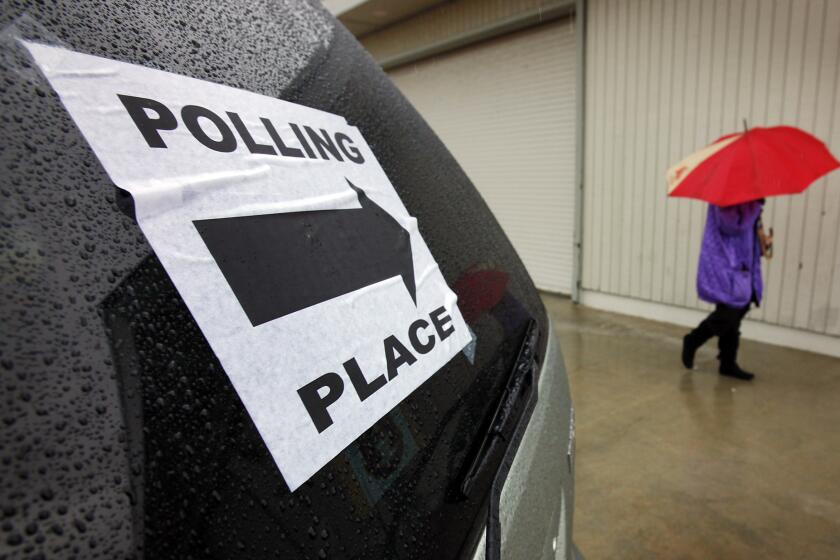Analysis:: Bernie Sanders never came close to beating Hillary Clinton, but his campaign still mattered. Here’s why
When Bernie Sanders took an early, exploratory trip to Iowa, a curious crowd of 150 or so turned out at a college-town bookstore, where they listened politely as he raged against the billionaires and oligarchs he said were destroying America.
The angry aria from the wild-haired, slouch-shouldered senator from Vermont was delivered beneath a sign reading “Science Fiction and Fantasy,” which seemed an apt, if unintended, metaphor.
How many people would take seriously a 73-year-old Jewish grandfather and democratic socialist, vying for the presidential nomination of a party he never joined and trying to topple one of the country’s most powerful political dynasties?
Plenty, it turned out.
Sanders’ thick Brooklyn baritone became a clarion call for the angry and the economically aggrieved, his rallies a sprawling coast-to-coast spectacle that blended the hippie vibe of Woodstock with the militancy of Occupy Wall Street.
His improbably strong White House bid won him more than 12 million votes and 22 states, made Sanders a household name and turned him into a cultural phenomenon, with a doppelganger on “Saturday Night Live” and a retinue of celebrity endorsers that made old, bespectacled and grumpy seem almost chic.
Sanders, who effectively ended his campaign in an online speech to supporters Thursday night, never came close to actually winning the Democratic nomination.
Still, he forced Hillary Clinton to embrace his populist economic agenda and echo his views on financial regulation, raising the minimum wage, reining in college costs, overhauling the campaign finance system and casting a more skeptical eye on foreign trade.
“He showed something real and powerful,” said Ben Tulchin, who conducted polling for the Sanders campaign. “That you can succeed politically by tapping into economic anxieties and frustration with Washington and offering bold, principled, progressive solutions.”
Sanders defied the notion that only millionaires and billionaires can wield their wallets and have a political impact, raising more than $200 million from mostly small donors without the help of a super PAC scooping up five- and six-figure checks.
He also became a cult figure to millennial voters, who swelled his crowds to stadium size, many of them tuning in and turning on to politics for the first time in their young lives
There is, however, an important difference between leading a movement and becoming the presidential standard-bearer of a major political party.
He showed ... you can succeed politically by tapping into economic anxieties and frustration with Washington and offering bold ... progressive solutions.
— Ben Tulchin, pollster for Bernie Sanders’ campaign.
One requires passion, a resonant message and the power of exhortation. The other calls for that and more: tactical maneuvering, intensive organizing, the massaging of political insiders and the nuts-and-bolts machinations of ensuring supporters turn out and cast their ballots.
Sanders proved brilliant at the former. The latter, not as much.
He started his long-shot campaign with some advantages.
Anyone who thought Democrats would simply coronate a candidate — any candidate — without a contest was either ignorant or chose to ignore the party’s fratricidal history.
The front-runner this time was singularly vulnerable to an insurgent challenge. Clinton’s resume — Ivy Leaguer, first lady, U.S. senator, secretary of State — fairly screamed establishment and status quo at a time many voters harbored a curdling animosity toward both.
But the institutional support Clinton enjoyed within the party — which her husband led through two terms as president — and abiding doubts about the viability of Sanders’ candidacy were twin hurdles the political independent-turned-Democrat never managed to overcome.
The skepticism pushed a substantial majority of superdelegates — party leaders and others with a guaranteed vote at the Democratic National Convention — into Clinton’s camp, however reluctantly, and gave her an enormous mathematical advantage over Sanders from the start.
The way the party awards its delegates, on a proportional rather than winner-take-all basis, meant that once Clinton began to pull away there was no way her rival could catch up short of notching one landslide victory after another.
The result was a self-reinforcing negative loop, at least among party insiders holding sway over the nominating process: Because Sanders never pulled close in the delegate count, many were unconvinced he was a truly viable candidate. Because he wasn’t seen as viable, there was no reason to abandon Clinton, who ran a far better, more disciplined campaign than in 2008.
To shake up the race, Sanders needed to do something dramatic.
His hopes rested on consecutive victories in the first three contests: Iowa, New Hampshire and Nevada. A string of losses might have fatally wounded Clinton and would certainly have dispelled the air of inevitability that helped buoy her candidacy.
Sanders lost narrowly in Iowa and clobbered Clinton in New Hampshire, Vermont’s next-door neighbor.
Nevada, which voted next, proved a turning point. Sanders battled from far behind — polling by both campaigns gave Clinton a 25-point lead — and pulled within striking distance. But lacking her strong on-the-ground operation and the longstanding political ties she enjoyed in a state her husband won twice, Sanders lost decisively, with 47% to Clinton’s 53%.
His defeat helped contribute to a Clinton romp a week later in South Carolina and opened the door for her to sweep the South, which proved vital.
With strong support from black voters, many loyal from her White House days, Clinton rolled up massive victories — she carried Mississippi by a margin of close to 70 percentage points — and built an insurmountable delegate lead.
The pattern would repeat itself. Though Sanders made inroads among younger black and Latino voters, he lacked the deep ties that Clinton enjoyed with those communities and tended to fare less well in states with sizable, ethnically diverse populations.
“He was unable to translate his basic message beyond younger white voters into a larger and more deeply reflective constituency of the Democratic Party,” said Paul Maslin, a Democratic pollster who nonetheless lauded Sanders’ candidacy.
“He lit a fire … with a whole lot of people who were convinced the Democratic Party had grown sort of stale,” Maslin said. “There is real promise there for the future. The positive side of him should not be discarded.”
Sanders also made a strategic decision early on that worked to Clinton’s considerable benefit.
He lit a fire ... with a whole lot of people who were convinced the Democratic Party had grown sort of stale.
— Democratic strategist Paul Maslin
In more than 40 years in politics — as the mayor of Burlington, a 16-year member of the House and two-term senator — he had never aired a negative television ad. It was a source of pride, and Sanders publicly committed himself to running a positive, issue-oriented presidential campaign.
Back in October, in their first debate, Sanders brushed aside a question about Clinton’s use of a private computer server while secretary of State, emphatically declaring that people were “sick and tired of hearing about your damn emails.” Clinton beamed; in a stroke, her rival laid aside one of the most politically nettlesome issues she faced.
He would eventually loosen the strictures of his no-negativity pledge, assailing Clinton’s judgment, questioning her qualifications and demanding she release transcripts of the high-paying closed-door speeches she delivered to Wall Street executives. They must have been “Shakespearean” to earn that kind of money, he scoffed, to the derisive laughter of audiences.
He even circled back to the email issue, suggesting on the final weekend before California’s June 7 primary that the controversy and pending legal questions were certainly something superdelegates, among others, “were keeping … in mind.”
By then, though, the tide of the race had long been all but irreversible.
Sanders scored scattered victories, most notably an upset in Michigan and wins in Wisconsin and Indiana.
The results, however, did little more than encourage Sanders to keep campaigning on the chance a mass of superdelegates would suddenly defect from Clinton and throw July’s convention open to a floor fight.
That was never likely to happen. Democrats may be fractious, but few were eager for that kind of spectacle, knowing the damage it could do to the party’s chances in November.
Sanders, for all his talk of political revolution, apparently isn’t holding out for that either. He said Thursday night he would work to push the Democratic Party in a more leftward direction — but not, he suggested, at the expense of winning the White House.
He made his thinking clear back in the spring of 2015, when his candidacy still seemed a fantasy and not yet a phenomenon. “I will not,” he said, “play the role of spoiler.”
ALSO
One week later, almost 2 million California primary ballots still must be reviewed
More to Read
Get the L.A. Times Politics newsletter
Deeply reported insights into legislation, politics and policy from Sacramento, Washington and beyond. In your inbox three times per week.
You may occasionally receive promotional content from the Los Angeles Times.











